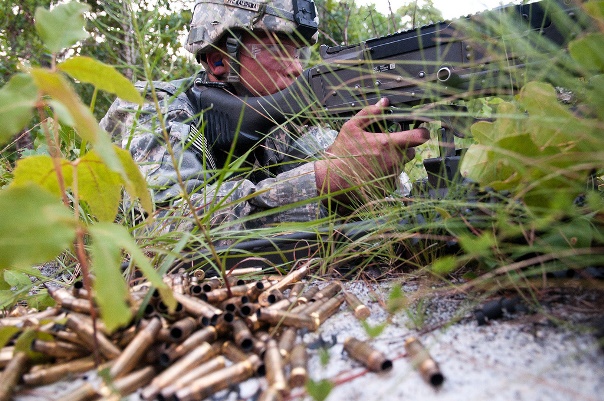The U.S. Army (Washington, DC) is searching for biodegradable ammunition to replace existing rounds used in training, citing the potential for traditional bullets to corrode and pollute the environment.
From January 10, 2017, to February 8, 2017, the Army solicited and accepted proposals1 from contractors related to the subject. As of March 1, Army officials were still in the process of reviewing the received proposals.
“Components of current training rounds require hundreds of years or more to biodegrade,” the U.S. Department of Defense (DoD) (Washington, DC) explains in its solicitation brief. “Some of these rounds might have the potential to corrode and pollute the soil and nearby water.”
As an alternative, the Army wants the new ammunition to make use of seeds, which can eventually produce food for animals.
“This effort will make use of seeds to grow environmentally friendly plants that remove soil contaminants and consume the biodegradable components developed under this project,” the Army says in its brief. “Animals should be able to consume the plants without any ill effects.”
History of Training Ammunition
At the moment, the Army manufactures and consumes hundreds of thousands of training rounds, which are fired at training ranges in the United States and around the globe. Additionally, special forces units conduct training exercises each day and night, utilizing these rounds.
According to the Army, the rounds include low-velocity 40-mm grenades; 60-mm, 81-mm, and 120-mm mortars; shoulder-launched munitions; 120-mm tank rounds; and 155-mm artillery rounds.
“The projectiles, and in some circumstances the cartridge cases and sabot petals, are either left on the ground surface or several feet underground at the proving ground or tactical range,” the Army explains. “Proving grounds and battle grounds have no clear way of finding and eliminating these [training items], especially those that are buried several feet in the ground.”

Military facilities currently comprise nearly 900 of the 1,300 most polluted sites in the United States, according to the Environmental Protection Agency (EPA)2, with much of the damage pre-dating modern awareness of environmental issues. As such, the Army is keen on finding a solution moving forward.
Experiments Show Promise
While the concept of biodegradable bullets might seem ambitious, the Army says the technology has already been proven by the U.S. Army Corps of Engineers’ Cold Regions Research and Engineering Laboratory (CRREL) (Hanover, New Hampshire) to have some success .
“The [laboratory] has demonstrated bioengineered seeds that can be embedded into the biodegradable composites and that will not germinate until they have been in the ground for several months,” the Army says in its brief.
The same base biodegradable material—to be injected with a bioengineered seed when used for potential ammunition—could also be utilized by private industry to make biodegradable water bottles, plastic containers, or any other composite or plastic product on the market, the Army writes.
The formal objective is for the chosen contractor to “develop biodegradable training ammunition loaded with specialized seeds to grow environmentally beneficial plants that eliminate ammunition debris and contaminants,” according to the brief.
Three-Phase Project
Once the contract is awarded, the Army says the work will be carried out in three phases.
During the first phase, the contractor will develop a process to produce biodegradable composites with remediation seeds that can be used to produce training rounds of between 40 mm and 120 mm.
“These training rounds shall meet all the performance requirements of existing training rounds,” the Army says. “The contractor should also explore avenues to produce biodegradable composites with remediation seeds for use in products outside the defense sector.”
In the second phase, the contractor will be asked to “prove out” the fabrication process and manufacture prototypes to demonstrate the process is ready for industrial use. As part of this phase, the contractor will also provide enough prototypes for the U.S. government to perform ballistic tests.
In the third and final phase, the selected contractor will coordinate with the Army’s official Program Executive Office Ammunition and other ammunition contractors to establish a formal transition scheme to implement the new technology.
“The solution is naturally occurring, biodegradable material to replace current training round materials, eliminating environmental hazards,” the Army says.
Source: U.S. Small Business Innovation Research (SBIR), www.sbir.gov.
References
1 “Biodegradable Composites with Embedded Seeds for Training Ammunition,” U.S. Department of Defense Small Business Innovation Research, Topic A17-012, November 2016.
2 S.H. Reuben, “Reducing Environmental Cancer Risk: What We Can Do Now,” The President’s Cancer Panel 2008-2009 Annual Report, U.S. Department of Health and Human Services, April 2010.